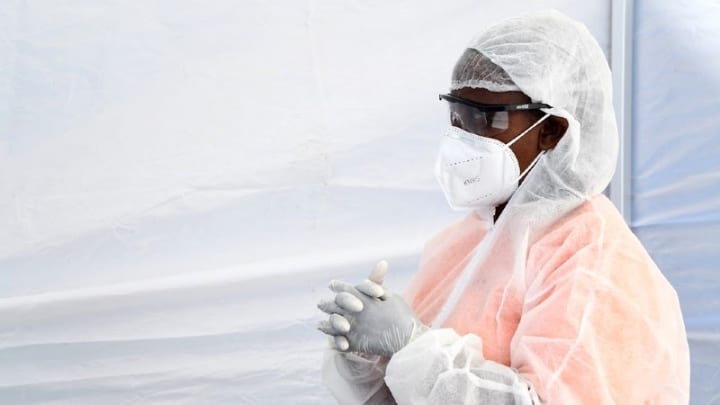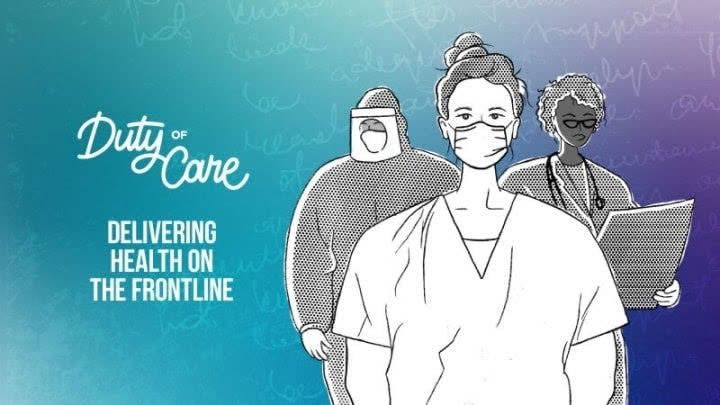
The COVID-19 pandemic and the global response to it have challenged the mental health of many, not least of all people living with noncommunicable diseases, who are at higher risk of severe illness from the virus. Factors including the loss of loved ones, financial hardship, isolation, and an uncertain future have left few people unaffected, but there is one group that faces an additional set of intense challenges.
This is part of our Duty of Care series
This series explores how health systems can better support and protect health care workers.
While most of the world is advised to stay at home, frontline health workers — about 70% of workers in the health sector globally are women — often endure endless hours on the job, placing the well-being of patients ahead of their own. For many, even basic needs go unmet, such as getting enough food, sleep, and exercise; feeling safe in their work; having child care; and being able to socialize and relax.
On the job, they deal with exceptional stress — shortages of medical and protective equipment, deaths of patients, sudden increases or changes in responsibilities, fear of infection, and stigmatization by their communities as being potential carriers of the virus. For those who are working in humanitarian settings, these stress factors tend to be more severe.
Already, the mental health effects of COVID-19 on health workers are being revealed. According to a United Nations policy brief, health workers in China reported high rates of depression (50%), anxiety (45%), and insomnia (34%). In Pakistan, health workers have reported moderate (42%) to severe (26%) psychological distress. Amongst health workers in non-pandemic times, the prevalence of mental health issues such as anxiety, depression, and suicide is higher than among the general population.
There is also evidence that even small increases in the demands on health workers can lead to burnout, causing health workers to leave their jobs, and dissuading potential new trainees from joining the health care sector.
This concerns us all, as we are already facing an anticipated shortage of 18 million health workers by 2030 worldwide. If we neglect to care for our carers now, we are likely to face extremely detrimental circumstances in the near future.
How to prioritize frontline workers’ mental health
Governments must urgently prioritize the mental health of frontline workers. It is crucial that health systems at country level are restructured to ensure they are able to provide mental health support at all times, and especially during emergencies. However, mental health challenges often carry the added burden of stigmatization by communities, and awareness campaigns that address this issue — such as the World Health Organization’s #HealthyAtHome campaign — should also be a part of the COVID-19 response and recovery.
Even when the pandemic is under control, health workers may continue to be vulnerable to its effects as they process their traumatic experiences, and mental health support must be readily available to them.
This is something we have learned from previous pandemics — a study on the long-term effects of the SARS pandemic among health workers found that almost 10% reported “high depressive symptoms” up to three years later. It also found a long-term risk for alcohol abuse and self-medication.
Employers must take an active role as well, starting by ensuring frontline health workers’ basic needs are met; for example, offering healthy food and drink at the workplace, encouraging exercise, offering child care solutions, and ensuring that they are given adequate time to rest as well as clear and confidential pathways to quality counseling.
Around the world, telemedicine is showing the potential to facilitate various mental health interventions, also offering greater flexibility and privacy. Interventions that incorporate gender-sensitive approaches may be especially useful, and digital solutions should be made accessible and available for all, including the most vulnerable communities.
We all have the responsibility to show our gratitude and respect for health workers by supporting initiatives for fair pay, improved working conditions and adequate staffing. This will require more than public demonstrations of solidarity by applauding health workers during the pandemic.
It requires governments to step up and put their money where their mouth is by increasing public spending for health services and investing in the resilience of the health workforce specifically.
Mental health has been disproportionately neglected and underfunded worldwide. In the Americas, national governments spend an average of just 2% of their health budgets on mental health, and this figure is lower in low- and middle-income countries.
This gap was already acknowledged by global heads of state and government at the 2018 U.N. High-level Meeting on NCDs, where for the first time, a U.N. political declaration on NCDs recognized the burden of mental health.
The COVID-19 pandemic shines a spotlight on this gap in care. Now is the moment to invest in mental health, starting with those most in need, which includes frontline health workers.
The world today is reeling from a pandemic that will continue to have an impact on public mental health far into the future. To create a healthy recovery, we must learn the lessons of the pandemic — a new, whole-of-society approach to mental health is needed which ensures that mental health care and support is available to all who need it.
We call for more investment in mental health care from governments. We owe a great debt to the health workers who care for us at all times, including during the pandemic, and we can best repay them by looking out for their well-being in return.
Visit the Duty of Care series for more coverage on how health systems can function better so that health care workers are supported and protected. You can join the conversation using the hashtag #DutyOfCare.






